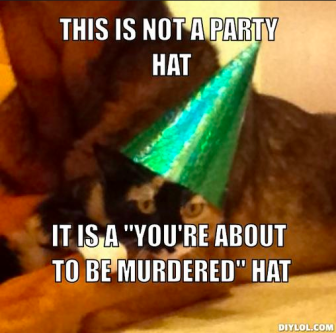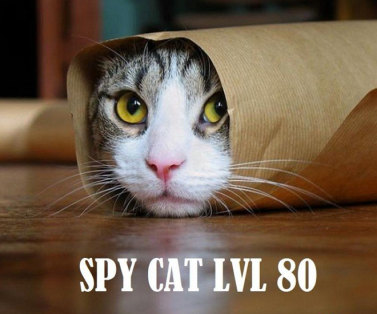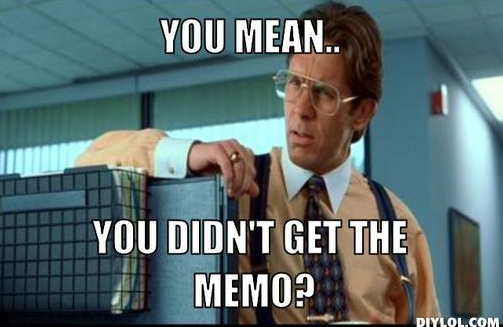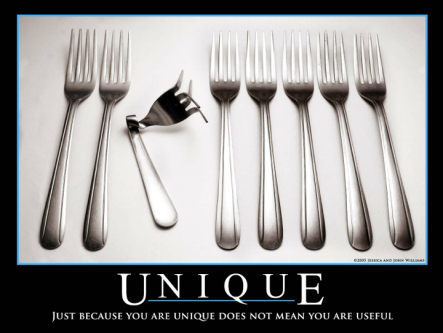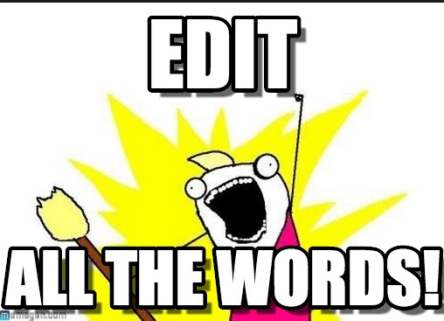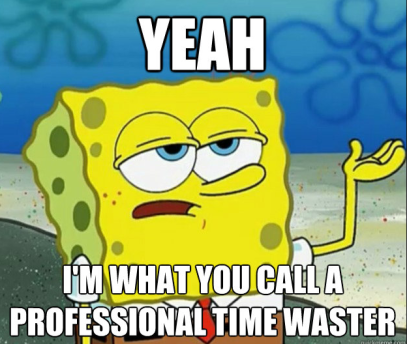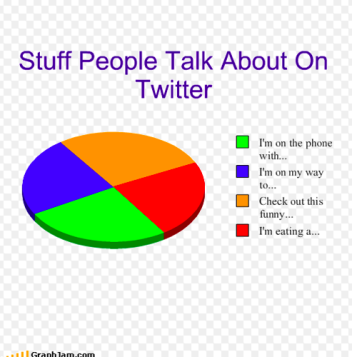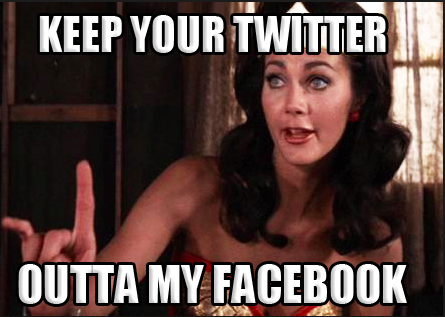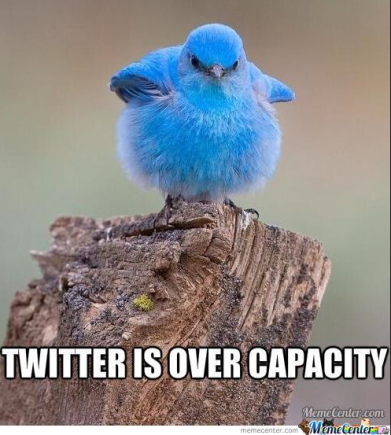Kristen Lamb's Blog, page 56
December 2, 2014
Test Your Holiday Style—Tiffany Crystal or Pre-Paid Bail Money?
Thanksgiving has whizzed past and Christmas looms ahead. If you’re anything like me, you make this super stupid promise to yourself roughly December 24th that you will buy gifts throughout the year, so you aren’t pressed and stressed and ready to stand on a roof with a shotgun holding the entire dish of rum balls hostage…and ALL the rum. No, this year will be different. I will be PREPARED.
*clutches sides laughing*
Yeah….
Sort of reminds me of finals back in college. Next time I am going to read all my chapters AHEAD of time.
Christmas is a magical time of year, but all of us handle the season differently. So what is your Holiday Style? Here’s a helpful little quiz:
1) When cleaning before the holidays, you:
a) Might give the mantel a light dusting just so you don’t look like a show-off. The gleam from your spotless fixtures could cause retinal damage. Eloise is a rank amateur next to you.
b) Make a plan to go room by room and whip your house into shape. Once this baby is clean, you KNOW it will stay that way for good. In fact, you’ve vowed to stab your husband in the face if he leaves his towel on the bathroom floor, and have threatened your children with a tell-all e-mail to Santa if they don’t put their clean clothes away properly.
c) Get a little excited because you haven’t seen your floors, counters or pretty much any of your home’s flat surfaces since the party last New Years. In fact, you are pretty sure the Christmas tree is still up under one of the piles of laundry and unopened mail. Hey, why take down decorations you know you will need every year?

Yes, this is um…ME *hangs head*
2) When it comes to holiday shopping, you:
a) Are already finished. You made a long, detailed list last January and have spent the year buying the perfect gift for all your loved ones. All that’s left is to enjoy the season while those ill-prepared dopes fight over the last Holiday Barbie.
b) Wait until Black Friday. Technically, you start three days before Black Friday. What better way to use all that camping equipment you got last year for Christmas, than to stake out the front of Apple, Ikea or Best Buy?
c) Dig through your closet for all the unopened crappy gifts you got at the office Secret Santa party last year and then re-gift them to your distant relatives. Sure, Aunt Edna doesn’t know who Justin Bieber is, but who wouldn’t want a singing toothbrush?
Well, other than you, of course.
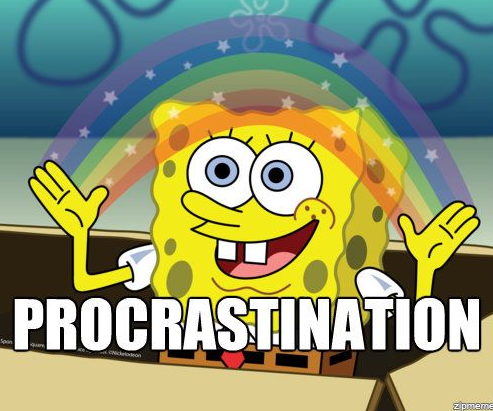
Tomorrow, I will do the wrapping….
3) When it comes to gifts, you:
a) Spare no expense. The holiday season is a season of generosity. All your gifts are thoughtful, beautiful, lavish, and better than everyone else’s.
b) Believe it’s the thought that counts, and most people will think you are cheap if they see the Clearance sticker on their present, which is why you LOVE black Sharpies. They can be counted on to fully black out the $4.99 on the bottom of that seashell vase from Anthropologie. Hey, we don’t have to pay retail to still give an awesome gift. You just make sure the gift recipient can see part of the original price of $89 so they feel like you “shelled” out a lot of cash.
c) Make one trip. Dollar General has everything you need for Christmas gifts. What could be a better Christmas gift than cans of Lite Vienna Sausages (Now Made with REAL Meat!) or Low-Sodium Spam?
4) When it comes to holiday memories, you:
a) Love capturing every moment on video, then editing the clips to music using your MacBook Pro. Then, of course you order prints from SnapFish so you can scrapbook together all the holiday magic. You have the cutest little snowman stickers that will add the perfect touch to the family newsletter you send out early morning December 26th.
b) Have them all in a big box that you will organize one day…once you locate the box.
c) Just get drunk on Jack and Coke then watch Jerry Springer reruns. The effect is pretty much the same.
5) Of all the Christmas carols, you:
a) Know Handel’s Messiah is your all-time favorite, and you know all the words. Why wouldn’t you? You sing in the choir every year.
b) Can’t get enough Silver and Gold, sung by Burl Ives. It reminds you of being a kid and waiting all year to see Rudolf the Red-Nosed Reindeer.
c) Think Grandma Got Run Over by a Reindeer is the funniest carol EVER, next to the Three Kings who tried to smoke a rubber cigar. In fact, you can’t even sing Deck the Walls with the correct lyrics.
6) As far as wrapping Christmas presents, you:
a) Use the tips you saved out of Martha Stewart Magazine. You bought the heavy duty paper and lavish bows last year at the Container Store After Christmas Sale and expensive ornaments 85% off at the Dillard’s After Christmas Sale. All your gifts look so beautiful, they might as well be considered Christmas decorations. No one ever wants to open your gifts until they’ve taken a picture of the wrapping.
b) Thought you were saving money when you bought the wrapping paper from Wal Mart. Of course, you didn’t foresee that it was as thin as rice-paper on a crash diet. After tearing the corners on every box you wrapped, you had to wrap everything AGAIN. This means ten gifts took 42 rolls of paper. You lost the tape, only to later find it stuck to your butt. The dog ate all the ribbon and is now pooping tinsel, and your husband has found it HYSTERICAL to put tape on all the cat’s paws instead of helping.
You make a note to buy big bottle of Maker’s Mark for next year’s wrapping.
c) The gifts you bought came pre-wrapped. It’s called a Dollar Store bag. DUH. You love the environment, so why cut down more trees when THIS Christmas wrapping paper can later be used to pick up the tinsely dog poop?
7) When it comes to dressing for holiday parties you:
a) Buy smashing outfit ahead of time so you have time to find the perfect accessories and shoes to match. Then you make sure to get an appointment with a hairdresser and makeup artist in October before the slots fill. Why trust those holiday pictures to anyone but a professional?
b) Buy an outfit ahead of time, but completely forget about shoes and earrings…and eating less. You bought the dress even though it was too small, because it was supposed to make you be “good” this year and not overeat. Ah, but that was until the dog started pooping tape and Christmas ribbon and you leveled the fudge like a Biblical plague (Baby Jesus would have been duly impressed).
So Christmas Eve you find yourself wandering the mall searching for the last pair of Spanks in the free world. Speaking of tinsel, you can’t help but wonder what the tinsel-strength of spandex is. In your mind, you imagine a Catastrophic Spanx Failure that takes out three innocent bystanders.
And is it considered an act of domestic terrorism if you survive?
c) Just wear yoga pants and a maternity top for the extra “give.”
8) As far as decorating for the holidays, you:
a) Hire professionals. Can’t be Yard of the Month without a little help. Your Christmas lights can be seen from space. The folks at NASA and the Soviet Space Station are your biggest fans.
b) Were going to avoid it altogether until it became evident that you were the ONLY house on the block without lights, and now you have been shamed into putting out some last-minute effort. Of course, everything was sold out, so you were forced to decorate with the Halloween lights.
Orange works, right? Hell, just put Santa hats on all the skulls. Make it a Goth Christmas.
c) Just plug them in. You left them up all year :D.
9) When it comes to your children and Santa, you:
a) Bake cookies for Santa with the kids, and Christmas Eve you take the little ones out into the yard and spread some “Reindeer Food.” Your husband dresses in a Santa costume and you “sneak” some iPhone footage of Santa at work in your living room to show the kids the next morning. Childhood is a magical time and you want to fuel your children’s imaginations.
b) Take them to Cabela’s. Free photos with Santa, fishing gear is 50% off, and they FINALLY have your ammo in stock.
c) Let your neighbor take your kids to Cabela’s. You still have to find the Christmas tree…after you level up on Halo 6.
10) When your kids question how Santa can make it to all the boys’ and girls’ houses in all the world in one night, you:
a) Tell them that Santa is the spirit of generosity and love, and that spirits have powers we mortals cannot comprehend.
b) Point the pizza kiosk in the mall and yell, “I’m buying!”
c) Inform your kids that Santa has been cloned, and reference the Star Wars Clone Wars.
11) When sending out holiday cards, you:
a) Buy cards for Christmas, Kwanzaa, Hanukah, and just general holiday cards and then send them to the appropriate recipients.
b) Buy generic reindeer cards, then write it “Happy Holi-Chrisma-Kwanzaa-kuh.” Your friends all know you’re weird anyway. Frankly, they are all shocked you got the cards sent at all.
c) Holiday Cards? *laughs hysterically until can’t breathe*
12) When someone gives you a dreadful gift, you:
a) Know they meant well, so you make sure they see you wearing that horrendous purple mohair vest at the church bake sale. You would never want to hurt anyone’s feelings.
b) Send a nice thank you note then return the gift for something you prefer.
c) Stockpile the crappy gifts away for next year, so you don’t have to do as much Christmas shopping. Hey, waste not want not.
Tally Your Scores!!!
Amazing Alice/Awesome Alan
If you answered mostly As, you get an A+++++ in Christmas. You, Amazing Alice/Alan, are the star of the show with the prettiest EVERTYHING, the one who has everything in order and who pulls out all the stops…which is probably why most of us secretly hate you and want to stab YOU in the face.
Normal Nancy/Typical Ted
If you answered mostly Bs, relax. You’re normal. While you probably could try a little harder, why bother? Amazing Alice and Awesome Alan are going to outdo you anyway.
Slacker Sarah/Lazy Larry
Hey, life is too short to be organized. There are video games to play.
I hate to say it but I am almost an even mix of Normal Nancy and Slacker Sarah. Every year I promise to try harder. ONE DAY I will be an Amazing Alice…yeah, no. My brother and sister-in-law are Amazing Alice and Awesome Alan so they enable my underachieving. Even why I TRY to make my Christmas packages look all awesome and professionally wrapped…they just look more like a roll of wrapping paper and Scotch tape had a drunken one-night-stand.
Sigh.
What is the worst Christmas gift you’ve ever gotten? My Aunt Iris once bought me a bright purple sweater that was so small, I think it was made for a Barbie, a child or a circus midget…then loudly commented on how fat I’d gotten when I couldn’t “try it on.”
So what about you guys?
I love hearing from you!
To prove it and show my love, for the month of DECEMBER, everyone who leaves a comment I will put your name in a hat. If you comment and link back to my blog on your blog, you get your name in the hat twice. What do you win? The unvarnished truth from yours truly. I will pick a winner once a month and it will be a critique of the first 20 pages of your novel, or your query letter, or your synopsis (5 pages or less).
For those who need help building a platform and keeping it SIMPLE, pick up a copy of my latest social media/branding book Rise of the Machines—Human Authors in a Digital World on AMAZON, iBooks, or Nook.

December 1, 2014
WHY Are We Writers? Understanding the Why Behind the Buy
Now that NaNoWrMo is finished, congratulations to those who WON. I only made it to a little over 34,000 words *sad face*, but I did it with Shingles so I am grading myself on a curve :P . As a writer, being delusional is totally acceptable. I’m actually not too far from finishing the novel, so I’m happy I tried.
Anyway….
For those who might be tempted to go back and edit? I recommend stepping AWAY. Work on something different or the odds of you seeing the problems aren’t too great.
Which is why we are shifting gears here on the blog and we’re going to talk about branding and social media. Oh, the cries of despair! Hey, I am here. No worries *hands paper bag*.
Here’s the thing. Nobody has to do social media. I won’t force you. The only writers who need to create a brand and do social media are writers who want to sell books.
Simple :D .
A New Perspective

Image via Flickr Creative Commons, courtesy of Sally Jean
I think it was in roughly 2004 when I was fiddling around on Friendster and Gather that I saw the potential ahead. For generations, novelists had a DISMAL success rate. Why?
Unlike NF authors of the time, we had NO practical way to build a platform before the books were released. We also had a nightmare of a time keeping fan fires burning between books because NYC was tooled (and mostly still is) to produce about a book a year.
That was fine back in the 90s. We weren’t a society who could walk around shopping on our phones. We weren’t addicted to apps and gaga over downloadable content. By 2007, purchasing had changed and we needed to respect that to remain relevant.
Social media and the Internet fundamentally altered our culture. It’s a cake that can’t be unbaked. This means it’s our responsibility to change as well.
The Golden Circle
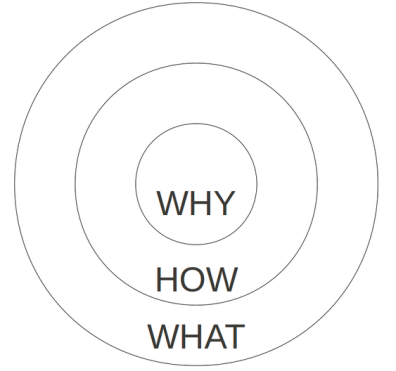
Image via Wikimedia Commons
I’ve actually used Apple as an example since my first book years ago, because they’re a perfect illustration of what we’re talking about. One of the many reasons that Apple Inc. surpassed others in multiple industries is they understood the difference between innovation and novelty.
Innovation is long-lasting. Novelty is short-term. Rather than beginning at the outside of the circle, the WHAT, Apple began with the WHY.
Sure, a Mac had a great processor and was immune to most viruses and megabyte, tera-byte, whatever-byte….but look how COOL I look at Starbucks with my white laptop. I support innovation, creativity. I challenge the status quo…and I LOOK COOL.
Rather than relying on gimmicks and short-term novelty, Apple created a culture. A culture that was loyal and didn’t need a bunch of free stuff and was willing to cough up retail price.
Conversely…
Most of us remember the earlier days of cell phones. This one TAKES PICTURES. Oooh, this one is FLAT. The cell phones got so small it was simply ludicrous. Why? Because novelty is pretty easy to copy and maybe even “improve” upon.” Novelty is fleeting and rarely cements relationships.
One of the reasons Apple demolished the music industry was Apple appreciated the changes in the consumer climate. Tower Records was still scope-locked on creating and selling LPs. The problem was that music originally was something enjoyed at home…until the Walkman, then later portable CD players, MP3s, etc.
Music became portable.
Consumers wanted to be able to go anywhere and enjoy their favorite songs, thus Apple spring-boarded off other technologies like the MP3 and made music personal. “A thousand songs in your pocket.” Personal, intimate, and simple. Apple invented the song industry. At first it was with the iPod, but then Apple merged music with our PHONES
Instead of blasting us with features we didn’t understand, Apple focused on WHY, not WHAT. Why carry an iPod and a cell phone when ONE is better than two?
What Does This Have to Do With Social Media?
One of the reasons I got into the whole social media business, was that it was clear that the consumer environment was fundamentally shifting. Yet too many companies were relying on tactics that either wouldn’t work, or wouldn’t work long-term. Any gains were (and still are) short-term.
Worse, the old methods are stressful for both the seller and the buyer.
To this DAY, I have to talk writers off a ledge when I mention social media.
My background is in sales, and I’ve witnessed this phenomenon time and again. Sure, lower the price. You’ll never be able to raise it. Give away free stuff, promotional stuff, t-shirts, free thumb-drives, pens, on and on and eventually? People are addicted to how much stuff they can get for nothing. There is zero loyalty.
This means one marketing tactic (algorithm) will work great…for a while. Then everyone starts using the same approach and it fizzles. This leaves the seller (author) with a panic attack and a migraine and less time to write more books.
Not only can the quasi-science of 90s-style marketing fail to cultivate loyalty, it can create something worse. Apathy. Beyond apathy, outdated marketing can poison a brand.
These tactics can create resentment, even hatred.
Just get 12 tweets in your feed about a free book and tell me you don’t see red.
Over the many years I have been doing social media, I have seen the same guerrilla tactics retooled and Bond-Oed. Marketing companies selling Facebook followers, Twitter followers, advertising, e-mail lists, promising reviews, etc. etc. And make no mistake, I’m not saying this stuff might not work. I’ve seen it work. Eh, kind of.
But what is the effect of years of making short-term decisions?
Which is WHY W.A.N.A. (We Are Not Alone) Began with WHY
Why do people buy books? Why do regular people believe they don’t like reading? Why does traditional marketing not sell more books (and never has)? Why is spam SO ineffective?
Why do so many writers give up? Fail to finish? Why are they overwhelmed?
Once I began with the WHY, I could move to the WHAT and then the HOW.
And I am going to tread carefully here, because W.A.N.A.’s success has never been about me. Without YOU, it’s just me talking to myself (which I already do far more than is healthy :D ). But I saw so many writers running from the single greatest tool for success (a strong platform) out of fear, and this defined my WHY.
WE ARE NOT ALONE.
YOU are not alone.
I don’t build platforms or tweet for people or build fan pages. I don’t blog for people and have no services to sell that will find followers or score reviews. Never have. Never will. Yes, writers of The Digital Age need a strong brand/platform, but no one ever said you had to do it by yourself.
So today we are going to start with something SIMPLE.
WHY are you writing? What is your WHY? If it is to make money? Find another job or change the WHY. People are very sensitive these days and can smell manipulation a mile away…and it gives them digital HIVES.
So if our only goal on social media to hawk a book? Formula to fail.
We will start with my WHYs to make it clearer. This is VERY redacted for the sake of time. But our WHY is our foundation and it’s worthy of considering and even articulating. It’s our mission statement.
WHY do I write social media books and blog?
Because when I started as a writer I was VERY alone. I struggled because of poor or even totally false information. I had no system of emotional support to be there during countless rejections. I HATED being alone and never wanted others to feel abandoned and hopeless.
I also saw the “current” way of doing social media (roughly 2008) was short-term. I sought to INNOVATE the notion of how we did social media and REINVENT the idea of a brand. It was less about exposure and all about community and relationships. We’d learn to be deeper, not cheaper.
I blog because I love the community, serving, and if you guys don’t want to buy my book? Most of the information you need is free and in my archives, because my WHY is SERVICE.
***Though the book is a lot faster and I am not AT ALL opposed to you buying one :) .
WHY do I write fiction?
I love to tell stories and entertain. I like to escape, to enjoy another world, and want to use my gift with words to do the same for others. Take them on an adventure. Maybe I can even help them learn a little about themselves along the way.
So let’s talk about YOU. Why do YOU want to be a writer? Why did you choose vampires instead of werewolves? Why erotica? Romance over thrillers? Mystery over YA? Why children’s books? And why does this matter to your readers? Why should it? ;)
It’s there. We all have to dig deep for the good stuff and I would LOVE to hear your whys. You guys always inspire me, so DANCE CUTE LITTLE MONKE—-, um share your thoughts :D .
I LOVE hearing from you!
To prove it and show my love, for the month of DECEMBER, everyone who leaves a comment I will put your name in a hat. If you comment and link back to my blog on your blog, you get your name in the hat twice. What do you win? The unvarnished truth from yours truly. I will pick a winner once a month and it will be a critique of the first 20 pages of your novel, or your query letter, or your synopsis (5 pages or less).
For those who need help building a platform and keeping it SIMPLE, pick up a copy of my latest social media/branding book Rise of the Machines—Human Authors in a Digital World on AMAZON, iBooks, or Nook.

November 27, 2014
A Writer’s Guide to Surviving The Holiday Party
Today, we have a holiday treat. My friend Liz Crowe (A.K.A. The Beer Wench) is here to help us make it through the holidays with our egos in tact. Liz is cool…like that zany cousin who let you watch Jaws when you were 5 and scarred you for life but then also taught you the proper was to apply eyeliner (more always better), how to make a temporary tattoo last…and look real enough to freak out your parents.
She’s the friend who will dare then double dare you and might get you in trouble but who will also give you the best memories and help you learn to love you for YOU and feel good about telling haters to get bent.
Take it away, LIZ!
***
We’ve all been there. The highly anticipated dreaded Holiday Office Party. Or—even better—the Holiday Family Gathering.
We love ‘em. We hate ‘em. Kinda like jogging or ironing. No matter your chosen career path, they can be an exercise in one-upmanship that rivals any Kardashian backyard barbeque. Because try as we all might to deny or quash it, the innate human need to one-up each other will not be denied, especially if there are in-laws and booze in the same general vicinity.
Never fear, Grasshoppers. Liz is here to help you.
So settle down, take some notes and prepare to Be Awesome.
CAVEAT EMPTOR Moment: Because this is a Liz Crowe/Beer Wench advice post you can be assured that virtual alcohol and grossly overblown familial stereotyping is involved—for literary bloggy effect, you see. For anyone sensitive to this particular vice and sarcasm, you might just go ahead and hit the “next blog” button instead of lecturing Kristen for allowing her space to be corrupted in such a manner.
The first thing we have to accept as a pre- or eve post-published author is this: “Nobody gets what we are doing or (in the case of parents) why.”
Period. Full Stop.
During The Holidays there is a lot of dead conversational space to fill, thanks to the fact that a bunch of people are shoved together for hours at a time with nothing in common but a bit of DNA (or the fact of their marriage into said DNA string). And sometimes, these folks try to understand it by asking you questions.
Be ready. These questions may force you to grind your teeth, grip your rocks glass so hard you break it or even…attempt to answer them.
Sure, while your body is in the overly warm room with a bunch of folks you are related to whether you want to be or not, your mind is back with your work. You’re grinning around the rim of your third glass of cheap box wine and mentally altering a Major Plot Point.
You’re sipping your over-poured, badly mixed gin drink and counting up all the word repetitions your recent editing torture session conjured. You are slamming crappy beers and quietly reliving your latest critique session—you know, the one where you cried and accused everyone of being against your future success?
In short, you are “working,” kind of like you always are, whether you’re physically wandering the grocery aisle, at a PTA meeting full of helicopter parents, or now, at a Holiday Party—and your skinny, over-achieving sister-in-law is headed your way with a bit of a wobble in her gait and a half empty Cosmo.
“So,” she says, coming too close and breathing booze in your ear. “That book of yours…I went ahead and checked it out of the library.” She winks, guzzles the pink liquid in her glass then tucks her arm into your elbow companionably.
“Thanks,” you whisper, wondering how much closer to the bar you can stand and not be lying on top of it.
“I don’t really…you know… read all that much but thought I’d try and support the fam. Hey, hon, get over here and congratulate the Big Time Author with me!” She screeches across the room but given the general level of drunken loudness, her spouse, your super successful ER physician brother with a PhD in engineering and a Juris Doctorate on top doesn’t hear her…at first.
But finally, he leaves the group of kids enthralled by his balloon bending and banjo skills and makes his sober way over to you, still trapped by his social X-ray wife.
“Hey there,” he booms, smacking you so hard on the back you stumble and recall how much he teased you when you were kids. “So tell me about this…’job’ of yours. Writing, is it? You know, I love those Jack Reacher books, right hon? You know that guy, that Lee person? That’s one creative guy. Hey, when can I get your book at the bookstore anyway?”
“Well,” you begin, mistakenly honestly believing you can explain the intricacies of the ‘indie publishing life’ to these people. “You see…”
“But your book was in the library,” sister-in-law slurs, hanging off her husband, your brother who is giving you that horrific, “Please explain it to me in ten words or less, I’m busy,” patient stare.
“Yes, well, I begged the libraries to take a copy. But the bookstores…”
“Hey, sweetie,” your brother says to his wife. “What about that book club you host at the club? Why don’t you offer up…um…what was the title of that book?”
“Oh, we still have to get through the Fifty Shades Trilogy and let me tell you we are having some fun with those! Grab me another, love bug,” she screams as your brother turns to the bar. “Why don’t you write books like those?” she asks, before you can escape. “Now that is some good writing…hot stuff…whew!”
She fans her face before getting distracted by one of the many family spawn milling around your ankles. “Let me know when that happens!” She waves her fingers and moves away toward the sister-in-law cabal in the opposite corner, her be-supportive mission obviously concluded.
You wait a few beats, count backwards from a hundred, then get a refill and resume your mental counting of your Facebook likes and twitter followers, pondering how you’ll be so dry and amusing, recounting this little ego-smushing episode on your blog in a few hours. Just a few…more…hours…
By the time the excruciating day/evening/weekend is over, you’ve started no fewer than a dozen conversations with various family members attempting to explain why it takes “so long” to write, get edited, get cover art, get promoted for a single novel. Or how come you keep submitting to agents and publishing houses despite the growing mound of rejections.
Or why you can’t write “like” (fill in the blank with the latest serial-flash-in-the-pan writer). Or how come they can’t get your book “for real” (read: in print form, at the local Barnes and Noble store when they buy their giant latte and grab their copy of People or Car & Driver on their lunch hour).
You’ve had to stop too many times before getting to the, “Well, Amazon’s algorithm changes mean I have to re-release every two weeks to get noticed,” bit, noting the general eye-clouding-over nature of whichever relative is attempting to make you feel successful over your little writing projects.
Why bother?
But wait! Before you run to the back bedroom and slam the door, think about it this way: No one is asking your brother to explain much about his job, or your sister-in-law(s) to relate her/their latest adventure in child rearing and crock pot meals after a long day of wage-slaving. What they do is pretty clear.
What you do…is mysterious.
And kinda cool.
Ok…VERY cool.

Authors get to be GOD….
My advice is to OWN that. Crush your cool mysteriousness to your chest and do what you do best as a story-teller: make some sh*t up.
I tried this at a party once. Challenged myself to come up with two-three quick sentence descriptions of the general awesomeness of my life as “Author” – or “Novelist” which is an even more esoteric term.
It sure beats getting into long, dreary, inside-baseball discussions of “rankings,” and “formatting issues,” “crit partners,” and “blogging,” especially with your sister’s drunk boyfriend who hears you say “Amazon” and blurts out something like “I love amazons….they’re so hot!”
People who don’t work with these things every day like you will never, ever understand them. Stop trying to make them, especially at a holiday party.
So leaving out the fact that many days I don’t make it out of my sweats or brush my teeth but have written four books this year and have the entire cast chosen for the (as yet un-optioned) Netflix series, I have had some luck convincing family members that I Am An Author.
And I Am Cool.
You are too, be you pre-almost-post published. And even if you are one of the dreaded mid-listers at a “real publishing house,” you know of what I speak here. What you do is creative, internal, and mostly unexplainable to your average brother or sister-in-law. So grab your next cheap, badly mixed cocktail and own it, fellow scribbler!
You can get real sympathy on Facebook later.
Make it a great Holiday season, all no matter what or why you celebrate. I leave you with this, hard-learned lesson: Don’t mix red and white wines and never (ever) start with brown liquor and end with wine unless you want to celebrate a whole day completely out of commission.
You’re welcome.
*************************

Liz Crowe, A.K.A. The Beer Wench
Amazon best-selling author, beer blogger, brewery marketing expert, mom of three, and soccer fan, Liz Crowe is a Kentucky native and graduate of the University of Louisville currently living in Ann Arbor. She has decades of experience in sales and fund raising, plus an eight-year stint as a three-continent, ex-pat trailing spouse.
Her early forays into the publishing world led to a groundbreaking fiction subgenre, “Romance for Real Life,” which has gained thousands of fans and followers interested less in the “HEA” and more in the “WHA” (“What Happens After?”).
With stories set in the not-so-common worlds of breweries, on the soccer pitch, in successful real estate offices and at times in exotic locales like Istanbul, Turkey, her books are unique and told with a fresh voice. The Liz Crowe backlist has something for any reader seeking complex storylines with humor and complete casts of characters that will delight, frustrate and linger in the imagination long after the book is finished.
Check out her first self-published series, coming in January 2015: The Love Brothers. Already garnering raves on Goodreads, book one (Love Garage) is available for pre-order on Amazon now.
Click here for free chapters from all the books and to enter during the final days of a huge, multi-author giveaway (including some goodies from Kristen Lamb!)
Don’t ever ask her for anything “like a Budweiser” or risk bodily injury.
Beer, Books & More Blog

November 26, 2014
Are We TRULY Thankful? Unseen Blessings that Can Change Our Lives

PLEEEEAAASE. Just ONE enchilada. I will love you FOREVER!
One thing I’ve learned is that happiness is a fleeting shadow. Contentment and gratitude are all that last. When circumstances dictate how we feel? Just accept that life is going to feel as if we are strapped to Hell’s Tilt-A-Whirl.
Because cats will never puke on tile instead of carpet, cars break, sinks leak, pipes bust, bills come, illness happens, kids act up, family WILL make us nuts, work will suck, some people will NEVER learn not to CC ALL in an e-mail, and the news will always be filled with the worst examples of “humanity.” EVERY network will spew doom, gloom, division, hate and hopelessness.
On the other side of that?
We also live in a society that tells us everything should be a highlight reel, that everyone ELSE is living a highlight reel, when truth is? That’s a lie. Most of life is Behind the Scenes and ugly and sticky and coated in cat fur and cracker crumbs.
I make it a point to begin every day with an attitude of gratitude. I think it is important, especially these days where it seems like every commercial tells us we aren’t thin enough, rich enough, successful enough, happy enough. We always need more “stuff” to be enough.
Stuff your Stuffies with MORE STUFF! Order now and we will sent you two FREE Stuffies to stuff EVEN MORE stuff!
I wrote a blog ages ago about focusing on success, that we tend to drift where the eyes focus. Race car drivers learn that if you want to cross the finish line, never ever take your eyes off the goal line. Look at the wall and you will hit the wall. I believe everything is that way. If we focus on where we are lacking, what others appear to have that we want? We run the danger of being deeply ungrateful, and that can be an extraordinarily defeating way to live.

Lately, I’ve had a hard reality to face. I’ve always been very healthy and exercise was a part our lives. Then, in late August, I came down with Shingles. It’s been three months of non-stop nerve pain and exhaustion. Since I can’t move a lot, I can’t work out, thus I can’t pass a mirror without cringing. I’m also an author and a small business owner and it feels like everything is going to seed before my eyes.
But? I have a malady that will eventually heal.
I have a wonderful little boy who is HIGH ENERGY. My author friend J.E. Fishman writes a thriller series about Bomb Techs. Highly recommended, btw.
ANYWAY….
As part of J.E.’s book promotion, he sent me a gift. Stress balls that look like little bombs with a fuse. This means every time I go to the bathroom, Spawn flings open the door and lobs a grenade and shouts “FIRE IN THE HOLE!” seconds before a stress ball dings off my head….then he runs away laughing.
It was seriously funny the first 7,651 times.
But shouldn’t it be funny EVERY time? Am I taking enough time to ENJOY this little boy who will grow up all too soon? There are the dishes, the laundry, the dusting, but am I ENJOYING the home I have? I love serving writers, blogging, teaching, but am I taking a moment to ENJOY all of you? I have the world’s best husband. I make it a point that, when he gets home from work, a fresh, hot meal is made and his clean pajamas and towel are laid out next to the shower, but am I ENJOYING him?

My legs went to sleep an hour ago…
Am I truly giving thanks?
I don’t know about you, but I know this is an area I can ALWAYS come up higher. Grateful people are happy people.
Thanksgiving seems to be the middle child of holidays. Halloween is fun and glitzy and exciting. Christmas is cute and we adore it and look forward to seeing it…and oh yeah, there’s Thanksgiving. Hey, do we even have decorations for that? Christmas is this magical time, and we often hear how we need to keep Christmas in our hearts all year long. Well, that is a great idea, but we would be wise to keep Thanksgiving there too.
We have all kinds of ways to be thankful and many things to be grateful for that we might not even notice. The next time you go to complain, I challenge you to think of the blessing that inconvenience really is. I do this myself when I hear complaints and grumblings coming out of my mouth. I’ll show you what I mean…
I am thankful for the searing nerve pain in my leg, because I still have a leg. It wasn’t blown off by an IED or amputated because of diabetes.
I am thankful for all the laundry I have to do, because it means I have clothes to wear.
I am thankful for the dishes that need washing, because it means I didn’t go hungry.
I am thankful for my BAZILLION food allergies, because it means my family eats very healthy.
I am thankful for the ENORMOUS electric bill, because it means my home has lights and heat.
I am thankful for the sheets that need to be changed, because it means I own a bed.
I am thankful for all the reading I have to do, because it means I’m literate.
I am thankful for the car that needs all new tires because it means I don’t have to walk miles and miles to get what I need.
I am thankful for that parking space waaaaayyyy out in the back, because it means I don’t have to park in a handicapped space. I can walk.
I am thankful for the garage that needs to be cleaned out, because it means I am blessed with plenty.
I am thankful for the chores to be done, because it means I have mom who loves me enough to travel to see me.
I am thankful for the litter-box that needs cleaning and the dog blankets that need washing because it means I have pets who love me unconditionally.
I am thankful for Johnny Cat who I have to shoo off counters and who breaks EVERYTHING, because he nearly died and now he’s back, healthy enough to wreak havoc (refer to above pic).
I am thankful for the split ends and six inches of roots I have, because it means I haven’t lost all my hair to chemo.
I am thankful for the Christmas cards I need to send, because they could as easily be funeral announcements.
I am thankful for the traffic snarls that catch me, because the body the firemen pulled out of the fatality accident could have been me.
I am thankful for the persistent leak in my sink, because it means that I have a home.
I am thankful for all the Christmas shopping I have to do, because it means I’m not alone.
I am thankful for my fluffy body because it could be emaciated and waiting on a food relief truck.
I am thankful for the son who would make a nest in my bra if he could (especially when I am WRITING), because it means I have a son who dearly loves me.
I am thankful that I sometimes have doubts and confusion about my future and my purpose when I think of the lives cut short before they ever had a future.
I am thankful for my freedom and the amazing men and women who put their lives on the line to protect it.
I am definitely thankful for all of you who bless me on this blog by giving me your time. Time is the most precious commodity we have and we never seem to have enough, but all of you are so generous to me. You share the very thing we all need more of….TIME. Thus, I’m immensely grateful you guys give to freely to me. I’m WAY thankful for my amazing WANA community. You guys are the bright spot to each and every day in my world and the world around you. It is such an honor and privilege to serve you.
And for a laugh and even a little food for thought, I LOVE this video…
What are you guys thankful for? Maybe things that vex you, but when viewed another way are unseen blessings. I’d like to hear your comments (which I am super especially thankful to get, by the way). Do you feel Thanksgiving kinda gets steamrolled? Do we need to learn to be more grateful as a culture? Is consumerism taking the place of genuine joy? What things do you do to make sure you remain grateful!
I LOVE hearing from you!
****
Yeah, yeah, I just griped about consumer culture, but writers need to eat too. Feel free to ignore and scroll down, but I DID write a book and it IS very helpful ;) . Happy Thanksgiving!
For those who need help building a platform and keeping it SIMPLE, pick up a copy of my latest social media/branding book Rise of the Machines—Human Authors in a Digital World on AMAZON, iBooks, or Nook.

November 25, 2014
7 Essentials Every Author Needs to Know About Twitter

Hmmm, looks like a ticket to TWITTER JAIL
I’m still delusional that I might finish NaNoWriMo. I can write 16,000 more words in five days, right? Sigh. I’ve been away from the blog because I’m in the trenches with the fellow Nanos. Also I really needed to take a bit of a break. To help me with my pseudo-sabbatical? The AMAZING Social Media Maven Marcy Kennedy is here to help you learn how to use Twitter effectively.
Using Twitter effectively is important. Twitter is a tool, but we can look like a tool or act like a tool if we rush in not knowing what we are DOING.
Great news is I have done all the dumb stuff so you don’t have to. Marcy might have, but I can’t speak for her (and she is kind of a Hermione) so she probably was smart enough to learn from MY dumb stuff…..

“Marcy”
Take it away, Marcy!
***
Twitter often gets a bad reputation from people who don’t understand it or don’t know how to use it to its full potential to build an author platform. If we’re misusing it or not using it to its full potential, not only will it not help us, but we also won’t be having any fun. And social media should be fun!
So today I want to walk through the seven essentials every author needs to know about Twitter. When used correctly, Twitter can be one of the best tools for increasing traffic to our blogs and gaining new readers for our books.
Essential #1 – Which Tools Work the Best for You
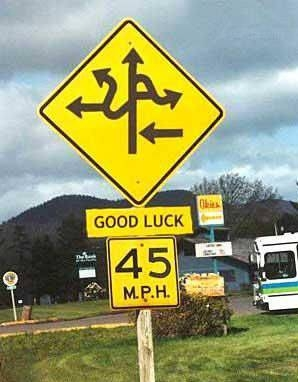
Social media can feel a little like THIS…
When we are new to Twitter, we might not realize we have options for tweeting other than using the twitter.com website. Hint: You don’t want to actually use Twitter.com to tweet. It only gives you one column and very few options. We need something more effective to manage our tweeting.
There are two basic choices—TweetDeck and Hootsuite. (There are others, but these two are the best.) You’ll hear from people who love one or the other, so the important thing is to choose the one you like the most.
Essential #2 – How to Use Hashtags
Using hashtags allows people we’re not already connected with to see our tweets (and vice versa). Effectively using hashtags is one of the quickest ways to build relationships with new people on Twitter…if we use them well.
Since I don’t want this post to be as long as a novel, I’ll direct you to a post I did for Kristen earlier called “Twitter Basics–The Proper Care and Feeding of Hashtags.”
Essential #3 – How to Use Lists

Organize ALL THE TWEETS!
One of the most common complaints I hear about Twitter is that the amount of tweets is overwhelming. There’s a simple solution—Twitter lists. A Twitter list can be added to a column in TweetDeck or a stream in Hootsuite so that we’re able to watch only the tweets made by the people on that list.
Once you know how to use them, they become a powerful tool not only for making Twitter more enjoyable, but also for building a viable author platform. Twitter lists can help:
Make connections with agents, editors, or book reviewers
Build relationships with other writers in your genre
Keep track of subject matter experts; connect with writers who live in your area
Reciprocate for people who regularly retweet your tweets
Stay in touch with fans who contact you about your book or say something good about your writing.
Essential #4 – What to Tweet
We’re writers, so the temptation is to be the “all writing, all the time” channel. Tweeting about writing some of the time is fine because it helps us connect with other writers, but it won’t help us connect with readers.
Connecting with readers is about joining in conversations and tweeting links to material that your potential future readers might be interested in. If you’re writing science fiction, tweet about new scientific inventions, for example.
If you’re writing romance, your audience might be interested in posts about love and relationships, about the latest fashions, or about exotic locations. If you’re writing thrillers, you could find true crime posts and interesting tidbits from the news to share.
Essential #5 – Avoid Connecting Facebook and Twitter
We won’t have success on any social media site unless we’re there, actively participating and building relationships. That means that connecting any two sites so that what we post on one automatically shows up on the other is a bad idea.
But connecting Facebook and Twitter so that your tweets carry over is also a terrible idea because what people look for from the two sites is different. You might think you’re saving yourself time, but you’re risking coming across as a spam bot instead.
Essential #6 – What Can Get Us Sent to Twitter Jail?
When it comes to Twitter, there are three big no-nos that can land us in Twitter Jail. Consider these the equivalent of speeding, driving down the wrong side of the road, and driving under the influence.
Follower to Following Ratios
People hit the magic number of 2,000 people they’re following and suddenly Twitter won’t allow them to follow anyone new. This happens when we don’t have enough people following you compared to the number of people we’re following.
If this happens, you’re going to have to go and clear out some of the people who aren’t following you back using a tool like justunfollow.com. If your ratio is so far off that you’ve been thrown in Twitter jail, you’re not going to get out just by begging a few more people to follow you.
Tweeting Too Often
I’m still shocked that people have this happen given that the technical limit is 1,000 tweets per day. However, this is also broken down into hourly limits. So if you think of it that way, you’re limited to approximately 83 tweets per hour. That might sound like a ridiculously high number you’d never hit, but if you’re taking part in some kind of Twitter party (e.g., a launch party for a book), you may actually find you hit this limit.
With the growing popularity of those types of events, as well as themed chats, you need to be especially careful about this limit if you’re the administrator of the event.
Spammy Behavior
Most of you are probably already aware of the major spam behaviors to avoid. Kristen has done an amazing job of educating writers about what counts as spam, but in case any of you are new to Twitter or don’t read Kristen’s blog quite as dedicatedly as I do, I really think these are essential to know.
Spam = If you post duplicate content over multiple accounts or multiple duplicate updates on one account.
So let’s say you created an account both for yourself and for your book and you post the same updates to both. That technically violates Twitter’s spam policy. If you post the same updates over and over again on a single account, it’s also spam and Twitter will suspend your account for this kind of behavior.
Spam = If your updates consist mainly of links, and not personal updates.
This is another reason why the conversation aspect of Twitter is so important. This is a social media site founded with the intent of both sharing information and providing people will a quick, easy way to voice their opinions and chat with others. Be aware that if you’re only posting links, you’re technically in violation of Twitter’s user policies.
Essential #10 – How to Connect Your Website to Twitter

Original image via Wikimedia Commons, courtesy of FEMA
Our home base on the Internet should never be a social media network. We should have a website (and ideally blog on our website as well) because that is a solid foundation to build upon.
Part of what we want to do is create a circle between our blog and our social media networks. We share material on social media, which draws people back to our blog, and they enjoy the content, so they return to social media and share it with the people they’re connected with. And the cycle continues and grows.
You’d be surprised how many people chop a hole in this cycle because they don’t enable sharing buttons on their blog or website. Make sure you have a button that people can click to tweet your blog post right from your website.
Want More Help with Twitter for Authors?
Please check out my book Twitter for Authors: A Busy Writer’s Guide (available in ebook and print forms). Building a thriving social media platform doesn’t have to steal all your precious writing time or cut into your time with your family. Twitter for Authors is about building a successful Twitter platform that’s sustainable for busy people.
In Twitter for Authors, you’ll learn…
• essential Twitter terminology,
• how to set up your account,
• the differences between TweetDeck and Hootsuite,
• techniques for staying safe on Twitter,
• how to build columns and lists and use them to find readers,
• the value of link shorteners and hashtags,
• what to tweet about,
• the most common mistakes writers make on Twitter,
• how to run a successful Twitter event,
• how to manage your social media time,
• and much more!
Twitter for Authors contains helpful advice for both Twitter newbies and long-time Twitter users who want to take their platform to the next level.

November 10, 2014
Book Promotion that Makes an Impression—Don’t Advertise When You Can PADvertise
Since most of us are neck-deep in work and NaNoWriMo, I thought it was time to talk about something OTHER than writing. How are you going to MARKET that NaNo novel by December 3rd, 2014?
Only amateurs need “revisions” *rolls eyes*.
We all know what we are writing is PURE GOLD begging to be unleashed available for purchase in time to pay off all the money we’ll spend on Christmas gifts. That and being a NYTBSA by the end of January of 2015 is a great start, right?
Any of you who regularly follow my blog know that I am totally out of my mind a bit eccentric. Saturday, Hubby took pity on me and let us go out to eat (a rare treat around here). As I closed the door to the stall, I noticed all the advertising on the back of the bathroom door. This cluttered wall of ads made me think about all the authors spamming non-stop about their books on Facebook and Twitter.
In fact, just a couple days ago, a writer who’d never even said, “Hello” asked me to promote his new sci-fi book. Suuuuuure, right on that.
Some writers are becoming worse than an Amway rep crossed with a Jehovah’s Witness. I mean, can the author book promotion get any more invasive?
Wait…
Maybe it can.
I’ve blogged so many times about the dangers of automation and how spamming people is counterproductive. I’ve talked until I am blue about how advertising our books has a terrible ROI (return on investment) and how most people don’t pay attention to it. Ah, but then it hit me. The main reason spam doesn’t work is because people ignore it and no longer “see” it, but what would they see?
Panty Prose—Not Advertising, Padvertising (TM)
We all know that roughly 85% of readers are women, and what do women need? Panty liners. YES, but what do they need more than springtime fresh girl parts? More FREE! books. Indie authors shouldn’t spam about their latest book release or .99 cent promotional sale.
Why?
Because it’s rude? No! Because it is obnoxious? Not quite. Because it smacks of desperation? Not at all. The reason authors shouldn’t spam about their books is because spam is for amateurs.
The real writer of the Digital Age doesn’t settle on blasting out non-stop self-promotional tweets. That is SO 2012. The REAL writer of the Digital Age realizes a captive audience is a a buying audience.
Catch readers with their pants down with Panty Prose.
Panty Prose is perfect for the indie author. Most readers are female and even females need something to read in the bathroom. We at Panty Prose (an imaginary division of W.A.N.A. International) have teamed up with Always against their will to offer your readers the best deals right in their pants. PADVERTISING.
Panty Prose not only offers you Padvertising to a guaranteed clientele, but we have all kinds of layouts to suit your Padvertising needs. Technology is your friend with Panty Prose. Put your book where it counts…
At Panty Prose, we even make it affordable for you to place your face in your reader’s pants…
As you can see, Panty Prose is inserting your ads into a virgin market begging to be tapped.
Why are all the romance authors giggling?
Anyway, while others might see a protective strip that gets tossed in the bin, we see an unused space to Padvertise your latest novel AND save trees! Instead of throwing away that paper strip, we can print catchy lines from your book so fans can collect them ALL…

Make Your Readers Want MORE….
Make Your Readers Your Fan for ALWAYS….
My writer pal, Chad, was happy to step in and help me with a mock up of The Panty Prose Motivational Series:
Panty Prompts for Writers:

Serious Chad, the choice for the Serious Writer.
Panty Praise:

Available in “Yes, I Noticed Your New Hair Style” and “No, Your Butt Doesn’t Look Big at ALL”
Panty Prose is dedicated to keeping women fresh while selling your books. Attending a writing conference? Well, there is a bathroom and everyone knows that even agents have to go potty sometime. Why not help them out? Keep them springtime fresh and give them your query. Elevator pitches are for losers, when you can use the Panty Pitch. The Panty Pitch comes in three fragrances, Sonnet’s Eve, New Office Supplies, and Double Espresso.
Panty Pitch:

Save agents time and keep them fresh!
Panty Prose for the Published Professional is a smart, savvy way to stand out from all the competition that still is relying on scheduled tweets, auto-DMs and posting ads on new FB friends’ walls.
Make an impression that will last for Always.
Yeah, I am a wee bit tired from NaNo and not enough meds. You know you’re punch-drunk (and have no social filters) when you spend a full day Photoshopping your face on a pic of a panty-liner, LOL. When I’m tired, my humor gets warped, even for me. But you know I am on to something!
W.A.N.A. is dedicated to giving you the evil genius you need for success. Aside from Panty Prose, what other “free spaces” could we exploit for book advertising? You know, to catch those who missed our 23 tweeted links, 6 auto DMs and five form letters.
So what do you think? Has the book spam gotten completely out of control? Are there other ways you can think of that are utterly invasive creative ways to market our books (Keep it PG, Please :D )? Does promoting/book marketing feel about as bad as Padvertising? ***Btw, it doesn’t have to be ;) ***
I LOVE hearing from you!
To prove it and show my love, for the month of NOVEMBER, everyone who leaves a comment I will put your name in a hat. If you comment and link back to my blog on your blog, you get your name in the hat twice. What do you win? The unvarnished truth from yours truly. I will pick a winner once a month and it will be a critique of the first 20 pages of your novel, or your query letter, or your synopsis (5 pages or less).
For those who need help building a platform and keeping it SIMPLE (without using something as AWESOME as Padvertising), pick up a copy of my latest social media/branding book Rise of the Machines—Human Authors in a Digital World on AMAZON, iBooks, or Nook.


November 6, 2014
Point of View—What IS It? How to Find the Perfect Voice for YOUR Story
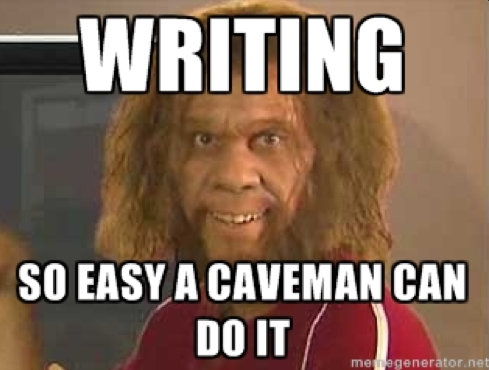
Geiko Caveman.
Monday, we talked about the Three Acts of a Writer’s Journey. The first hint we might be tipping into The Apprentice Phase is we hear the word P.O.V. and panic. What is THAT? Prisoners of Vietnam? Pets of Vegans? Pals of Viagra?
We ALL know writing a novel is FAR from easy. We just make it look that way ;) .
Today, I’m putting on my editor’s hat. Many of you decided to become writers because you love to write. Duh. I’ll even bet most of you, back when you were in school, also made very good grades in English. Thus, you might assume that you naturally know how to write a novel that is fit for successful publication.
Maybe you do. But, if you are anything like me when I started out? You might not know as much as you think you do.
Why?
Our high school English teacher didn’t care that we used 15 metaphors on one page. Why? Her goal was to teach us how to properly use a metaphor…NOT to prepare us for a career in commercial fiction. Same with college.
The single largest mistake I see in new manuscripts is the author does not understand P.O.V. and often this is why agents and people like me only need a page or two to know the manuscript/writer isn’t ready to publish.
This is an easy mistake to make, in that, as I stated earlier, formal education classes aren’t neccessarily there to teach us how to be great novelists. Some writers pick up on P.O.V. intuitively, but most of us need to be taught, lest we leave the reader feeling as if she is being held hostage on Hell’s Tilt-A-Whirl.
P.O.V. Prostitution (A.K.A. Head-Hopping)
Let’s step back in time to the days before we all made the decision to become writers. I would guess (hope) all of us were readers. We loved books, and books were a large part of what prompted our career choice. Ask yourself the following questions:
Have you ever tried to read a book, but eventually had to put it down because it was too confusing? You couldn’t figure out who was doing what, and you needed Dramamine to keep up with the perspectives?
Have you ever read a story that was so good you actually felt as if you had taken on the character’s skin? His success was yours, as was his failure. By the final page, you were sad to say good-bye?
P.O.V. used properly can create entire worlds, and breathe life into characters. Used improperly, it can make your reader feel like she’s been bungee-corded to Satan’s Merry-Go-Round—not good.
First, we have to know what P.O.V. is if we hope to use it to our advantage.
P.O.V. stands for Point of View.
Although this literary device is one of the most vital tools an author possesses, it is probably the number one style problem I encounter as an editor. I cannot count how many new writers (and, sadly, some not-so-new writers) give me a blank stare when I write P.O.V. in big red letters all over their manuscripts (and H.H., but we’ll get to that later).
The best way to describe point of view is to think of your story as viewed through the lens of the video camera. How many people (characters) are going to be permitted to hold that camera?

Image courtesy of Jon Gosier, via Flickr Creative Commons
Is your camera going to travel with one main character through the entire story? Or, do others get a turn? Is “God” holding the camera? These are simple questions you can answer to help you select the point of view perfect for your story.
There is no wrong P.O.V., but we do have to be consistent. P.O.V. is a HUGE factor in determining our writing voice.
What are the types of P.O.V.? What are their inherent weaknesses and strengths? For the record, this is HIGHLY redacted for the sake of time.
A quick overview:
First-Person P.O.V—uses “I” a lot. Only one character (the narrator) has the camera.
There are three disadvantages to this P.O.V.
1. This P.O.V uses a lot of “I” which can become repetitive to the point of distraction.
2. The reader can only see and hear what the narrator knows. This limits the flow of information. Probably good for a mystery, but if you aren’t writing a mystery this may not be the right P.O.V for you.
3. First-Person P.O.V is a bugger when it comes to tense. Why? Because First-Person breaks into two camps.
There is the I Remember When camp and the Come Along with Me camp.
One is in past tense, a recollection. “I remember the day my father and I were attacked by a pack of Mary Kay ladies gone feral….”
The other is in present tense, and the reader is along for the ride. “I walk these streets every morning, but today I am just waiting for something to go wrong….”
Note of Caution: It is extremely easy to mix the two camps together. Tense can be problematic…okay, a nightmare.
The benefit of First-Person? First-person P.O.V. adds an intimacy that no other P.O.V. can, and is useful for stories where we might want to withhold information from the reader.
Third-Person P.O.V—is when you, the writer, permit one or more of the characters to lug the camera through your story.
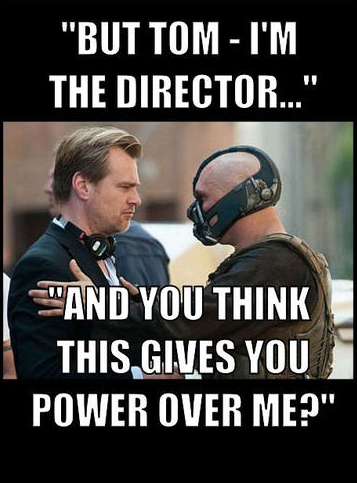
Um…YES.
Third Person Locked allows only one character access to the camera. The entire story is told through what that particular character can experience through the 5 Senses. So, if your character’s eyes are “shining with love,” then she’d best be holding a mirror, or you are guilty of head-hopping.
Third Person Shifting allows more than one character access to the camera. Here’s the rub. Your characters must to play nice and take turns. Only one character with the camera at a time. When the next character wants a turn, there has to be a clear cut.
Think of the director’s clapboard ending one scene before shifting to the next. It is usually a good idea to limit one P.O.V. per scene. When we switch perspectives inside the same scene, that is called head-hopping, and it will confuse and frustrate our readers.
There are advantages to Third-Person Shifting:
1. It can add additional depth and insight to your story.
2. It can allow you (the writer) to hold back information and add to suspense.
3. Third-Person Shifting can allow other characters to take over during emotionally volatile points in the story.
For instance, if your protagonist walks in on her brother lying dead in a pool of blood, the emotions experienced are realistically too overwhelming to be properly articulated by your protagonist. In this scenario, First-Person P.O.V might not be the best fit. The scene might be more powerful if told from someone watching this protagonist react to discovering a deceased loved one.
Ah, but there are also inherent problems with Third-Person Shifting.
1. Your characters must play nice and take turns. Otherwise, your reader will likely become confused and eventually frustrated.
2. It is best to permit camera access to key characters only. The reader has to stay in one head long enough to feel connected. Too many perspectives can easily become overwhelming and dilute the strength of your characters.
Omniscient P.O.V is when “God” gets to hold the camera.

Oh stop mucking it up and give Me the camera…
This P.O.V is like placing your camera up high over all of the action. The narrator is omnipresent and omniscient. “If Joe had only known who was waiting for him outside, he would have never left for that pack of cigarettes.”
Joe cannot experience anything beyond the 5 Senses (third-person). So, unless Joe is actually Superman and possesses X-Ray vision, it takes an omniscient presence to tell us someone bad is lurking outside waiting to do Joe harm.
There are advantages to Omniscient P.O.V.
1. Omniscient can relay information that would be far too overwhelming to describe if limited to the 5 Senses. Epic battle scenes are a good example.
2. Omniscient can give information critical to the story that the character doesn’t have to personally know. For instance, in NYTBSA Bob Mayer’s Area 51 Series (which I HIGHLY recommend), he relays a lot of factual and historical information that is critical to understanding the plot. But, it would really seem bizarre to the reader if his characters just started spouting off the history of the pyramids like an Egyptologist.
To avoid this jarring scenario, Bob used an omniscient presence to relay the information so the prose would remain remain nice and smooth and the fictive dream could stay in tact.
There are disadvantages to Omniscient P.O.V.
1. Third-Person P.O.V. and Omniscient P.O.V. are VERY easy to tangle together.
2. Omniscient P.O.V. and Head-Hopping are not the same, but are easy to confuse. I’ve edited many writers who believed they were employing Omniscient P.O.V. In reality, they were just letting every character in the book fight over the camera simultaneously, leaving me (the editor) feeling like I was trapped in the Blair Witch Project.

Whose head am I in? I can’t tell. Help meeeee…..
Proper use of P.O.V. takes a lot of practice to master. It is very easy to shift from one type of P.O.V. to another, or what I like to call “P.O.V. Prostitution” or “Head-Hopping.”
Key Points to Remember:
In First-Person—Come Along with Me stories can easily turn into I Remember When stories (or vice versa). Tense is a big red flag. Do you shift from present to past or past to present? Pay close attention to verbs.
In Third-Person (Locked & Shifting)—Characters will only play nice and take turns if you, the writer, force them to. Make sure whatever is happening in a scene is something that could be filtered through ONE character’s 5 Senses.
In Third-Person (Locked & Shifting) —“God” is really bad about grabbing your character’s camera, so keep an eye on Him. If there is suddenly information your character has no way of knowing through the 5 Senses, that is a big clue the Big Guy snagged your camera. Just remind Him nicely of commandment number eight, and ask Him to give the camera back.
In Omniscient—“God” is in charge. Be careful your wide-lens isn’t zooming in and out and making your reader dizzy in the process.
P.O.V. is one more reason it is critical for writers to read if they hope to become great authors. Read, read, read. Read all kinds of books by all kinds of authors using different P.O.V.s to see how it is done well.
EXAMPLES:
Suzanne Collins brilliantly employs First-Person in the Come Along with Me fashion in her Hunger Games Trilogy. Her choice of P.O.V. gives an intimate feel no other P.O.V. can, and, since it isn’t an I Remember When story, Collins is able to maintain reader suspense.
Stephen King does a great job of using first-person in an I Remember When style in The Green Mile. King chose this P.O.V. for a very specific reason, which I will not say so as not to spoil the ending even though y’all have had like, TWENTY YEARS to read it.
Dennis Lehane does an amazing job of employing omniscient in Mystic River. If you think you might want to use omniscient, I’d recommend reading him.
James Rollins uses third-person shifting very well in The Doomsday Key. Third-shifting is generally a great P.O.V. for thrillers in that it helps manage/reveal a lot of information that the protag may or may not know.
I would recommend Jonathan Maberry’s Patient Zero: Joe Ledger Series. I HIGHLY recommend Iron River by T. Jefferson Parker. Both these authors mixed third-limited and first-person and the effect is impressive.
P.O.V. when used properly can take a story to a whole new level. Read, experiment and practice. I know I just touched on a handful of suggestions, so feel free to add your thoughts, expound, ask questions.
I LOVE hearing from you!
To prove it and show my love, for the month of NOVEMBER, everyone who leaves a comment I will put your name in a hat. If you comment and link back to my blog on your blog, you get your name in the hat twice. What do you win? The unvarnished truth from yours truly. I will pick a winner once a month and it will be a critique of the first 20 pages of your novel, or your query letter, or your synopsis (5 pages or less).
For those who need help building a platform and keeping it SIMPLE, pick up a copy of my latest social media/branding book Rise of the Machines—Human Authors in a Digital World on AMAZON, iBooks, or Nook.


November 3, 2014
The Three “Acts” of a Writer’s Journey—From Newbie to Master

Pirate Code=Writing Rules. Clearer now? :)
The mark of a great storyteller is they make our job look easy. The story flows, pulls us in, and appears seamless. Many of us decided to become writers because we grew up loving books. Because good storytellers are masters of what they do, we can easily fall into a misguided notion that “writing is easy.” Granted there are a rare few exceptions, but most of us will go through three acts (stages) in this career if we stick it through.
Act One—The Neophyte
This is when we are brand new. We’ve never read a craft book and the words flow. We never run out of words to put on a page because we are like a kid banging away on a piano having fun and making up “music.” We aren’t held back or hindered by any structure or rules and we have amazing energy and passion.

Woodleywonderworks Flikr Creative Commons
But then we go to our first critique and hear words like “POV” and “narrative structure.” We learn that maybe we don’t know as much as we think we do and that we need to do some training. We also finally understand why so many famous authors drank…a lot.
Act Two—The Apprentice
The Apprentice Phase comes next. This is where we might read craft books, take classes, go to conferences and listen to lectures. During the early parts of this phase, books likely will no longer be fun. Neither will movies. In fact, most of your family will likely ban you from “Movie Night.” Everything now becomes part of our training. We no longer look at stories the same way.
The apprentice phase is tough, and for many of us, it takes the all the fun out of writing. The apprentice phase is our Act II. It’s the looooongest, but filled with the most growth and change. It’s the span of suck before the breakthrough.

Image via KcdsTM Flikr Creative Commons
It’s like when I first started learning clarinet and I had to think of SO MANY THINGS AT THE SAME TIME. I was new at reading music, and I had to tap my foot to keep the beat at the same time I keyed notes (which I keyed incorrectly more times than not). I had to hold my mouth a certain way, blow air with just the right force, pay attention to the conductor…and most of the time I needed a nap afterwards.
Not to mention I sounded like someone was water-boarding a goose.
WHY did I want to play clarinet? I wondered this a lot.
Same with writing. Many shy away from craft books because they fear “rules” will ruin their creativity. Truth? They will, but only for a little while ;) .
Eventually we realize that rules were made to be broken. BUT, the difference between the artist and the hack is that the artist knows the rules and thus HOW to break them and WHY and WHEN. We start to see rules as tools.
As we move through The Apprentice Phase and we train ourselves to execute all these moves together—POV, structure, conflict, tension, setting, description, dialogue, plot arc, character arc—it eventually becomes easier. In fact, a good sign we are at the latter part of the apprentice phase is when the rules become so ingrained we rarely think about them.
We just write.
We’ve read so much fiction, watched (and studied) so many movies, read so many craft books, heard so many lectures, and practiced so much writing that all the “rules” are now becoming instinct and, by feel, we are starting to know where and how to bend, break or ignore them.
Writing is now starting to become fun again, much like it was in the beginning when we were banging away on the piano keyboard. Like the clarinetist whose fingers now naturally go to the right keys without conscious thought, we now find more and more of the “right” words and timing without bursting brain cells.
The trick is sticking it through the apprentice phase long enough to engrain the fundamentals into the subconscious.
Master
This is where we all want to be. In fact, we all want this on Day One, but sadly, I believe this Day One Master is reserved for only a handful of literary savants. Mastery is when we return to that childlike beginning. We write with abandon and joy and, since the elements of fiction are now part of our DNA, our literary marrow, what we produce isn’t the off-key clanging of a neophyte, it’s actually a real story worth reading. Granted, it isn’t all kittens and rainbows. Masters have a lot of pressure to be perpetual geniuses.

Portrait by Yosuf Karsh via Wikimedia Creative Commons
I believe most of us, if we stick to this long enough, will always be vacillating between the Advanced Apprentice Phase and the Mastery Phase. If we choose to try a totally new genre, we might even be back to Neophyte (though this will pass more quickly than the first time).
We have to to keep growing. The best writers still pick up craft books, refresh themselves in certain areas, read other authors they enjoy and admire to see if they can grow in some new area. Masters seek to always add new and fresh elements to the fiction.
The key to doing well in this business is to:
1. Embrace the Day of Small Beginnings—Starting is often the hardest part. Enjoy being new. Enjoy that feeling because you will reconnect with it later because you recognize it.
2. Understand We All Have an Apprentice Phase—We will all be Early, Intermediate, then Advanced Apprentices. How quickly we move through these will be dictated by dedication, hard work and, to a degree, natural talent.
3. No One Begins as a Master and Few Remain Permanent Masters—Every NYTBSA was once a newbie, too. When we understand this career has a process, it’s easier to lighten up and give ourselves permission to be imperfect, to not know everything. Many writers get discouraged and give up too soon because they don’t understand there is a process, and they believe they should be “Masters” right away.
Hey, I did.
We need to give ourselves permission to grow. If we love and respect our craft, we will always be learning, so we will continue to dip back into “Apprentice” to refine our art even further.
Does this make you feel better to know this career has a process? Are you in the Act II span of suck and getting weary? What are you doing to remain focused? Which part has you the most discouraged? Frankly, I am in the trenches doing NaNoWriMo with you guys. I can say it is A LOT easier this year than in previous years. We can’t refine and edit words that don’t exist. Write with the abandon of the Neophyte then edit with the eyes of an Advanced Apprentice or Master ;) .
I love hearing from you!
To prove it and show my love, for the month of NOVEMBER, everyone who leaves a comment I will put your name in a hat. If you comment and link back to my blog on your blog, you get your name in the hat twice. What do you win? The unvarnished truth from yours truly. I will pick a winner once a month and it will be a critique of the first 20 pages of your novel, or your query letter, or your synopsis (5 pages or less).
For those who need help building a platform and keeping it SIMPLE, pick up a copy of my latest social media/branding book Rise of the Machines—Human Authors in a Digital World on AMAZON, iBooks, or Nook.


October 31, 2014
Writing Spies: Five Dos and Don’ts
Piper is back to guest post once more. I’m scrambling to catch up after being flattened from travel/work. Le sigh. Also have to get my NaNo tools together. Coffee, candy, energy drinks, stun gun, duct tape. So enjoy your Halloween. It’s kind of like New Year’s Eve of the Writing World. Party hard and have your fun because tomorrow….
Anyway, if you happen to be working on an action or thriller or some book involving those of the intelligence community, this post will help tremendously. Great writers ALWAYS do their homework. No one cares about our glorious prose if we goof something that five minutes on Google would have answered. But for the stuff maybe Google CAN’T answer? We have Bayard and Holmes…
By Piper Bayard
Spy thrillers are a staple of genre fiction, and a good “Bond” never goes out of style. However, a bad “Bond” can have those in the know throwing your book out the window of an Aston Martin faster than you can shake your martini. My name is Bayard. Piper Bayard. And my best friend and writing partner, Jay Holmes, is a 40-year veteran covert operative. I’m here today to help you write books that stay inside the sports cars.

Sean Connery and his Aston Martin
Image from Goldfinger
Many books have been thrown from this car.
1. DON’T let your covert operative announce her identity, or that she is a covert operative.
Cover operatives are . . . wait for it . . . covert. Unlike James Bond, covert operatives don’t reveal their identities, and especially not while on missions. Even decades after they are out of deep cover, they keep their work to themselves. That’s because when they are revealed, former assets and current loved ones alike can become targets.
That also means that, when a celebrity author shows up in an “I’m a Spook” T-shirt flaunting a “covert” career, it’s a dead giveaway that though she may have done some great and necessary work with an intelligence agency, she has never been a covert operative in the field. Covert operatives must forever keep a Chinese wall around their true identities.
2. DON’T call your spooks “spies.”
Yeah, I know. Then what’s with the title of this article? I hadn’t gotten to tell you that “spies” are actually “spooks” yet. I didn’t want to confuse you on that point before you got this far.
Holmes and his ilk are “spooks,” not spies. As Holmes says, “Spying is seamy. It’s what the Russians do.”
Spooks refer to each other lightheartedly as “spooks.” That’s also what military personnel call them when military and intelligence operations overlap. For example, if an intelligence team is working in a secured area of a ship, the crew refers to them as “the spooks.”
There is no official Dictionary of Spook Terminology, but the proper terms for spooks are “intelligence operatives” and “intelligence agents.” By habit, “operative” is used by CIA personnel when they are talking among themselves or reviewing an operation, and “agent” refers to someone – usually a foreigner – who is collecting information in a foreign country. Intelligence personnel are the “operatives” who are managing the foreign “agents.”

Note the spook putting on his seatbelt
Not Holmes
Image from CanstockPhoto
3. DO put on your spook’s seatbelt.
Car chases happen, but they don’t happen without seat belts. Every now and then, a spook might have to drive the wrong way up a one-way street or wheel down the Spanish Steps. *cough, cough, Holmes, cough, cough* But when he does, he wears his seatbelt. Religiously. “Because you can’t finish the mission if you’re dead.”
4. DON’T let your spook duck into a doorway to spy on her target.
That’s a good way for a real spook to get dead.
One of the first things spooks must learn about following people is to not be followed themselves. It’s common for bad guys to have their own people tailing them to pick up any newcomers, so spooks can’t only focus on who’s in front of them. They have to be acutely aware of who is behind them, too. If they duck into doorways and peek around the edges, they are making it obvious to anyone behind them that they are watching someone.
That means that if a spook wants to watch someone from a doorway, she has to take her eyes off the target, go all the way inside a building, and only turn around once she’s out of sight of the street. Then she can come back out and stop in the doorway under some other pretense than watching someone. It also gives her the chance to handle the bad guy’s trailing entourage.

Rosa Klebb — Room service gone bad.
Image from From Russia with Love
5. DON’T let your spook order room service.
How many times has Bond ordered room service? And how has that worked out for him? You’d think he would have learned after Rosa Klebb’s stunt in From Russia with Love that this is a seriously bad idea. Even the spooks in the otherwise realistic movie Act of Valor ordered take out and paid the price.
This isn’t only because of the opportunity for an enemy to poison them, it’s also because it’s generally bad juju for spooks to invite strangers into their space when they are on missions. In fact, Holmes won’t even have a pizza delivered to his house. The only food he actually enjoys is his own, his wife’s, or mine if it includes chocolate, and only then if he is eating at home or at the home of a trusted friend.
These are only a few of the most common blunders that Holmes and I see in movies and books. If you’d like to learn more about writing spooks, keep an eye out for Truth & Fiction posts at Bayard & Holmes.
Do you have any questions? I will answer some here in the Comments section and some on posts over at Bayard & Holmes.
* * * * * * * * * * * * *
Don’t miss The Spy Bride Blogger Challenge and Giveaway!
Click HERE for details.
We have some wonderful prizes for readers to celebrate the release of our debut novella, THE SPY BRIDE, in the RISKY BRIDES Bestsellers’ Collection. Sign up for the Bayard & Holmes Newsletter and be automatically entered to win a Secret Decoder Ring, a stash of Ghirardelli chocolate, or a bottle of sparkling wine from Mumm Napa vineyard.
Bayard & Holmes Newsletter Link–Click Here to Enter
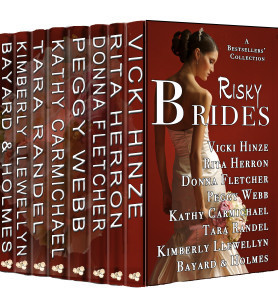
RISKY BRIDES . . . 8 genres. 8 novels and novellas. 8 takes on what makes a RISKY BRIDE. Now on sale for a limited time at only $.99 and available at Amazon, Barnes & Noble, iBookstore, and Kobo.
Amazon
Barnes & Noble
iBookstore
Kobo
* * * * * * * * * * * * *
 Piper Bayard is a bestselling author and a recovering attorney. Her spy thriller writing partner, Jay Holmes, is an anonymous senior member of the intelligence community and a field veteran from the Cold War through the current Global War on Terror.
Piper Bayard is a bestselling author and a recovering attorney. Her spy thriller writing partner, Jay Holmes, is an anonymous senior member of the intelligence community and a field veteran from the Cold War through the current Global War on Terror.
You can contact Bayard & Holmes in comments below, at their site, Bayard & Holmes, on Twitter at @piperbayard, on Facebook at Bayard & Holmes, or at their email, BH@BayardandHolmes.com.


October 29, 2014
Write a Terrific Novel (NaNo), Minimize Revisions, & Improve Odds of Finishing AND Publishing

Image via Flikr Creative Commons. Bansky’s “Peaceful Hearts Doctor” courtesy of Eva Blue.
We’ve already discussed the importance of fueling the muse BEFORE NaNo. But, fueling the muse, creativity, talent and all that jazz IS NOT enough. Finishing, while fantastic, is ALSO not enough. If we finish, yet have written something that can never exist off life-support? We’re back at Square One.
Though I am a fan of NaNo (National Novel Writing Month which is NOVEMBER) and Fast Draft, these tactics will work for writing ANY novel and minimize revisions.
AND…you don’t even have to be a plotter (Hint: I’m not. More of a Plotser–> Plotter + Pantser)
One of the major reasons many writers fail to complete the story is there isn’t a single CORE story problem in need of resolution. The story dies because it lacks a beating heart and a skeleton.
Stories with no hearts and skeletons are primordial adverb ooze and not good for much other than scaring small children.
A great trick one of my early writing mentors taught me was to go to the IMDB and look up log-lines of movies. Search for ones similar to the story you want to write and use it as a template. I will use an older and timelessly popular movie so I don’t spoil anything. Y’all have had 30 years to see the movie, so, yeah.
For instance, the log-line for Romancing the Stone is:
A romance writer sets off to Colombia to ransom her kidnapped sister, and soon finds herself in the middle of a dangerous adventure.
Okay, so here is “Kristen’s story”:
An OCD accountant sets off to Mexico to find her missing little brother and soon finds herself in the middle of a dangerous adventure.
It’s good enough. But, I am a perfectionist and not a fan of “good enough.” Let’s give more detail. When it comes to log-lines, I would have written Romancing the Stone THIS way with this formula:
Protagonist must do X (active goal) in order to stop X (antagonist) before super bad thing happens (ticking clock).
A fraidy-cat romance (INHERENT PERSONALITY TRAIT THAT ASSUMES ARC) author (PROTAGONIST) must travel to Columbia and partner with a shady smuggler to rescue her sister (ACTIVE GOAL) from jewel thieves (ANTAGONIST) before they feed her sister to alligators (SUPER BAD THING/ TICKING CLOCK/STAKES).
Using this formula and log-line, we can use it as a pattern for my made-up-this-morning story:
An OCD accountant (PROTAGONIST) must travel to Mexico City and partner with a former Green Beret ex-patriot to save her prodigal brother (ACTIVE GOAL) from a drug cartel (ANTAGONIST) before the cartel makes him an example to other dealers who lose shipments to Border Patrol (SUPER BAD THING/ TICKING CLOCK).
I just made up this log-line, but doesn’t it speak VOLUMES about the story? Why is the accountant OCD? Is she the older child who took care of a younger brother who was out of control? The more little brother got involved with bad people, the worse her OCD became? By using “prodigal brother” we get a sense that maybe he was trying to turn his life around and leave being a user and a dealer.
Ah, but “getting out” isn’t so easy.
By saying we have an “OCD accountant” we’ve picked the WORST person to send into the filthy bowels of cartel-land, let alone partner with a Green Beret. She’s going to want to control everything and maybe even use disinfecting wipes on all things in sight (including her Green Beret friend). We see how this could easily be a thriller, a romance, or even a comedy depending on how we write it.
With just this ONE sentence, we KNOW how the story ends and where. It ends in Mexico with brother alive and drug cartel either dead or in jail. So, we know where we are GOING. This makes plotting (even very basic Pantser-Plotting) simple. If our OCD accountant ends up in Kansas instead of Mexico, we know we took a wrong turn.

NaNo can feel a little like THIS…
There are now only so many options that lead to Mexico and finding little brother. There are only so many ways she can encounter an ex-pat Green Beret. Does he save her from being mugged? Does she HIRE him? Does he hit on her in the airport and she turns him down because his clothes are wrinkled and now she can’t get rid of him?
This log-line tells us VOLUMES about character arc, and, as the late Blake Snyder said, “Everybody arcs!”
Accountant is going to have to get over her OCD and become less controlling/neat-freakish and probably FORGIVE little brother, and maybe Green Beret needs to lighten up or even be more serious. If he’s an ex-pat, he could be running a sunglass kiosk on the beach and his motto is “Don’t worry, be happy” because he spent enough years being serious. His relaxed manner might drive her insane.
Formula for AWESOME conflict.
By looking at the IMDB, we can check out movies we loved and likely find there was a solid core story problem (code for “good log-line”). Most of the movies we hate? The ones where we are all like, “Great, two hours I can NEVER get back.” Odds are? Crappy log-line.
Worst….movie….ever (and I don’t give a rip what Sundance says). Melancholia. But I should have known from the log-line:
Two sisters find their already strained relationship challenged as a mysterious new planet threatens to collide with Earth.

Image from “Melancholia” but also MY face the ENTIRE TIME WATCHING THIS MOVIE.
Who is the protagonist? There ISN’T one (trust me on this). What is the active goal? Again, NOT THERE. “Finding a strained relationship challenged” is NOT AN ACTIVE GOAL.
It’s a sentence for misery. And, yes, I am bitter.
The movie is literally two sisters b!tch!ng at each other until everyone dies….and there was much rejoicing because I hated everyone in the movie and was happy they were all obliterated.
Yes, there is a super bad thing/ticking clock (a mysterious planet threatens to collide with the Earth) but there is NO WAY TO STOP IT. So the viewer is trapped with the Family from HELL until everyone dies.
The end.
ARRRRGGGGGGGHHHHHHHHHH!
We can learn a lot about what TO DO by studying what NOT TO DO. Yeah, yeah, Melancholia was pretty and had great cinematography and if you watch the movie on MUTE, it probably rocks. But for story? Not there. Trust me. This is three and a half hours of my life I will never get back AND $15 because I was stupid enough to BUY the movie and I can’t even regift it because there is no one I hate that much.
Sorry if I have offended any readers who LOVED Melancholia.
And for a movie that was NOT just supposed to be “art” here’s an older post about how Spiderman 2 (also known as THE MOVIE THAT WOULD NOT END) blew it because the log-line was LAME. Never underestimate the teaching capabilities of movies or books we hate. Why did we hate it? When did we lose interest? Why? Now, make sure WE don’t do that in OUR book ;) .
But, feed your muse a solid log-line to keep hold of and this will help you spot Bunny Trails of DOOM far easier. It will keep you on track and make that 50,000 words something solid that can be revised, because there will be the bones and beating heart of an actual story beneath all the superfluous description, poor dialogue or small rabbit trails all of us have to edit out later.
What are your thoughts? Does this formula help? What are some of the best/worst movies you have seen? Can you tell a stinker from the log-line? What catches your attention? What loses it? What movies are ones you watch over and over and buy a copy? WHY? Why THAT movie? For me? Minority Report, I Robot, and Monty Python’s–The Holy Grail. Generally because every time I see these movies I catch something NEW.
I LOVE hearing from you!
To prove it and show my love, for the month of OCTOBER, everyone who leaves a comment I will put your name in a hat. If you comment and link back to my blog on your blog, you get your name in the hat twice. What do you win? The unvarnished truth from yours truly. I will pick a winner once a month and it will be a critique of the first 20 pages of your novel, or your query letter, or your synopsis (5 pages or less).
For those who need help building a platform and keeping it SIMPLE, pick up a copy of my latest social media/branding book Rise of the Machines—Human Authors in a Digital World on AMAZON, iBooks, or Nook.




